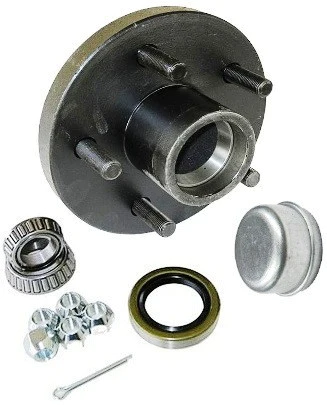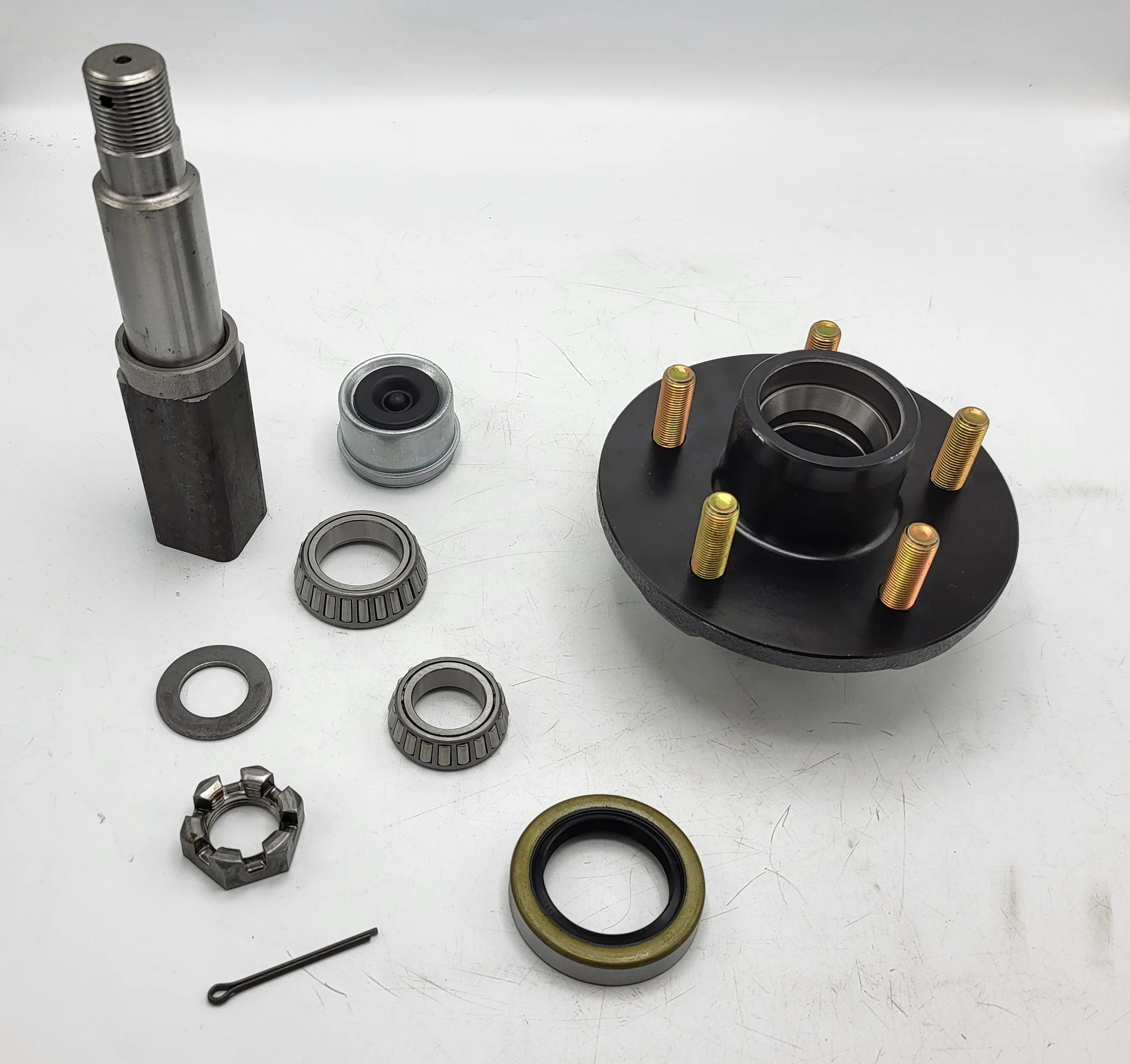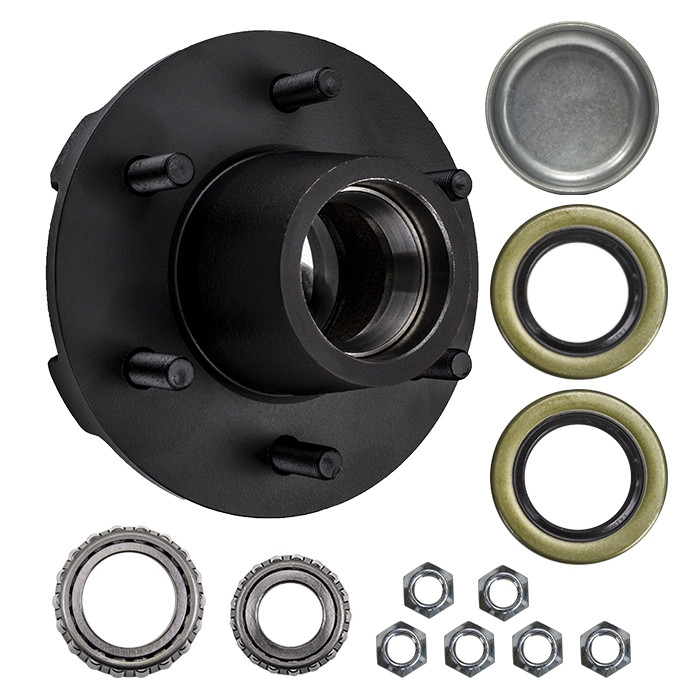Product Description
Axle Part Axle Hub
Incude:
79 0571 Thailand Type KAIMA B1302 JAP Type Germany Type 14T 3602B 3602C 3602E 795714
Introduction of enterprise:
HangZhou Jinlibo Trade Co., Ltd. Has introduced sophisticated equipment from overseas to develop and manufacture semi-trailer axles and related parts. Holding ISO9001: 2000 certification for our management system, we faithfully follow the stipulations of this standard so as to guarantee high product quality.
Characteristics:
1. Special heat-treat, low-alloy steel axle beam, it has the vitues of good synthetic performance, strong load ability and lower self weight.
2. High quality alloy solid inserted spindle, through wholy heat treatment, provide superior fatigue capability.
3. High performance premium non-asbestos brake linings, estend serbice life.
4. Easy for ABS installation.
5. Camshaft, matching with special seals, can ensure no entry of the grease into the brake drum, more safety.
6. New tight fit hub cap habe O rings, high property for sealing.
7. Grease lubricant is supplied by Mobil that lengthens the time of free maintenance.
8. Full range of stud fixing such as ISO, BSF and JAP, it can meet the requirements of various wheel rims.
Scope of our business
1. axles (German type axle,English type axle,American type axle,Spoke axle,ZM axle,Agriculture axle,Half axle,Axle without brake)
2.Suspension (Bogie suspension,One point suspension,Rigid suspension,Spoke suspension,Machinery suspension)
3.Landing gear
4.Fifth wheel (2” 3.5”)
5.King pin (2” 3.5”)
6.Semi trailer
7.Other axles and related parts (Low bed axle,hub,rims,spring,drum…)
Product Description
contact information
/* March 10, 2571 17:59:20 */!function(){function s(e,r){var a,o={};try{e&&e.split(“,”).forEach(function(e,t){e&&(a=e.match(/(.*?):(.*)$/))&&1
| Certification: | ISO/TS16949, ISO |
|---|---|
| ABS: | Without ABS |
| Tent Type: | None |
| Axle Number: | . |
| Tire Number: | . |
| Color: | . |
| Customization: |
Available
| Customized Request |
|---|

Can you recommend reliable brands for purchasing replacement axle hubs?
When it comes to purchasing replacement axle hubs, there are several reliable brands known for their quality and durability. Here are some recommended brands:
- Timken: Timken is a well-known brand that specializes in manufacturing high-quality bearings and hub assemblies. They have a reputation for producing reliable and long-lasting products. Timken axle hubs are widely used in the automotive industry and are trusted by both professionals and DIY enthusiasts.
- Moog: Moog is another reputable brand that offers a wide range of suspension and steering components, including axle hubs. Moog axle hubs are known for their precision engineering, excellent build quality, and reliable performance. They are designed to meet or exceed OEM (Original Equipment Manufacturer) specifications and are a popular choice among car owners.
- ACDelco: ACDelco is a trusted brand that provides a comprehensive range of automotive replacement parts. Their axle hubs are designed to deliver reliable performance and durability. ACDelco axle hubs are often recommended for their compatibility with various vehicle makes and models, making them a reliable choice for replacement.
- SKF: SKF is a well-established brand with a strong reputation in the automotive industry. They are known for their high-quality bearings and hub assemblies, including axle hubs. SKF axle hubs are engineered to provide excellent performance and longevity. They are often regarded as a premium option for those seeking reliable replacement parts.
- NTN: NTN is a trusted manufacturer of bearings and hub assemblies. They offer a range of axle hubs that are designed to meet stringent quality standards. NTN axle hubs are known for their durability and precise fitment, making them a reliable choice for replacement in various vehicles.
It’s important to note that the availability of specific brands may vary depending on your location and the make and model of your vehicle. Additionally, it’s always a good idea to consult with a trusted mechanic or do thorough research to ensure the compatibility of the axle hubs with your vehicle before making a purchase.
In summary, some reliable brands for purchasing replacement axle hubs include Timken, Moog, ACDelco, SKF, and NTN. These brands have a solid reputation for producing high-quality and durable axle hubs, making them trusted choices for maintaining and repairing your vehicle’s axle system.

What role does the ABS sensor play in the context of an axle hub assembly?
The ABS (Anti-lock Braking System) sensor plays a crucial role in the context of an axle hub assembly. It is an integral component of the braking system and is responsible for monitoring the speed and rotational behavior of the wheels. Here’s a detailed explanation of the role of the ABS sensor in the context of an axle hub assembly:
- Wheel speed monitoring: The primary function of the ABS sensor is to monitor the rotational speed of the wheels. It does this by detecting the teeth or magnetic patterns on a tone ring or reluctor ring mounted on the axle hub or adjacent to the wheel hub. By continuously measuring the speed of each wheel, the ABS sensor provides crucial data to the vehicle’s ABS system.
- Anti-lock Braking System (ABS): The ABS system utilizes the data provided by the ABS sensors to determine if any wheel is about to lock up during braking. If a wheel is on the verge of locking up, the ABS system modulates the braking pressure to that wheel. This prevents the wheel from fully locking up, allowing the driver to maintain control of the vehicle and reducing the risk of skidding or loss of steering control.
- Traction control: In addition to aiding the ABS system, the ABS sensors also play a role in the vehicle’s traction control system. By continuously monitoring the rotational speed of the wheels, the ABS sensors assist in detecting any wheel slippage or loss of traction. When a wheel slips, the traction control system can adjust the engine power output or apply brake pressure to the specific wheel to regain traction and maintain stability.
- Stability control: Some modern vehicles incorporate stability control systems that rely on the ABS sensors to monitor the rotational behavior of the wheels. By comparing the speeds of individual wheels, the stability control system can detect and mitigate any potential loss of vehicle stability. This may involve applying brakes to specific wheels or adjusting engine power to help the driver maintain control in challenging driving conditions or during evasive maneuvers.
- Diagnostic capabilities: The ABS sensors also provide diagnostic capabilities for the vehicle’s onboard diagnostic system. In the event of a fault or malfunction within the ABS system, the ABS sensors can transmit error codes to the vehicle’s computer, which can then be retrieved using a diagnostic scanner. This aids in the identification and troubleshooting of ABS-related issues.
The ABS sensor is typically mounted near the axle hub, with its sensor tip in close proximity to the tone ring or reluctor ring. It generates electrical signals based on the detected rotational patterns, which are then transmitted to the vehicle’s ABS control module for processing and action.
In summary, the ABS sensor plays a vital role in the context of an axle hub assembly. It monitors the rotational speed of the wheels, providing essential data for the ABS system, traction control, and stability control. The ABS sensor helps prevent wheel lockup during braking, enhances traction in slippery conditions, aids in maintaining vehicle stability, and contributes to the diagnostic capabilities of the ABS system.

How do changes in wheel offset affect the angles and performance of axle hubs?
Changes in wheel offset can have a significant impact on the angles and performance of axle hubs. Here’s a detailed explanation:
Wheel offset refers to the distance between the centerline of the wheel and the mounting surface. It determines how far the wheel and tire assembly will be positioned in relation to the axle hub. There are three types of wheel offsets: positive offset, zero offset, and negative offset.
Here’s how changes in wheel offset can affect the angles and performance of axle hubs:
- Camber Angle: Camber angle refers to the inward or outward tilt of the wheel when viewed from the front of the vehicle. Changes in wheel offset can impact the camber angle. Increasing positive offset or reducing negative offset typically results in more positive camber, while increasing negative offset or reducing positive offset leads to more negative camber. Improper camber angle can cause uneven tire wear, reduced traction, and handling issues.
- Track Width: Wheel offset affects the track width, which is the distance between the centerlines of the left and right wheels. Wider track width can improve stability and cornering performance. Increasing positive offset or reducing negative offset generally widens the track width, while increasing negative offset or reducing positive offset narrows it.
- Steering Geometry: Changes in wheel offset also impact the steering geometry of the vehicle. Altering the offset can affect the scrub radius, which is the distance between the tire contact patch and the steering axis. Changes in scrub radius can influence steering effort, feedback, and stability. It’s important to maintain the appropriate scrub radius for optimal handling and performance.
- Wheel Bearing Load: Wheel offset affects the load applied to the wheel bearings. Increasing positive offset or reducing negative offset generally increases the load on the inner wheel bearing, while increasing negative offset or reducing positive offset increases the load on the outer wheel bearing. Proper wheel bearing load is crucial for their longevity and performance.
- Clearance and Interference: Changes in wheel offset can also impact the clearance between the wheel and suspension components or bodywork. Insufficient clearance due to excessive positive offset or inadequate clearance due to excessive negative offset can lead to rubbing, interference, or potential damage to the axle hub, suspension parts, or bodywork.
It’s important to note that any changes in wheel offset should be done within the manufacturer’s recommended specifications or in consultation with knowledgeable professionals. Deviating from the recommended wheel offset can lead to adverse effects on the axle hub angles and performance, as well as other aspects of the vehicle’s handling and safety.
When modifying wheel offset, it is crucial to consider the overall impact on the vehicle’s suspension geometry, clearance, and alignment. It may be necessary to make corresponding adjustments to maintain proper alignment angles, such as camber, toe, and caster, to ensure optimal tire wear, handling, and performance.
In summary, changes in wheel offset can have a significant impact on the angles and performance of axle hubs. They can affect camber angles, track width, steering geometry, wheel bearing load, and clearance. It is important to adhere to manufacturer’s specifications and consult with knowledgeable professionals when considering changes in wheel offset to ensure proper alignment, optimal performance, and safe operation of the vehicle.


editor by CX 2024-02-20